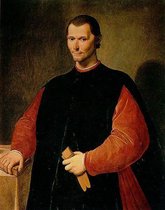History of Florence and of the Affairs of Italy Ebook Tooltip Ebooks kunnen worden gelezen op uw computer en op daarvoor geschikte e-readers.
Afbeeldingen
Sla de afbeeldingen overArtikel vergelijken
- Engels
- E-book
- 9781465527448
- 08 mei 2024
- Adobe ePub
Niccolò Machiavelli
(Bron: Wikipedia. Beschikbaar onder de licentie Creative Commons Naamsvermelding/Gelijk delen.)"
Samenvatting
Niccolo Machiavelli, the first great Italian historian, and one of the most eminent political writers of any age or country, was born at Florence, May 3, 1469. He was of an old though not wealthy Tuscan family, his father, who was a jurist, dying when Niccolo was sixteen years old. We know nothing of Machiavelli's youth and little about his studies. He does not seem to have received the usual humanistic education of his time, as he knew no Greek. The first notice of Machiavelli is in 1498 when we find him holding the office of Secretary in the second Chancery of the Signoria, which office he retained till the downfall of the Florentine Republic in 1512. His unusual ability was soon recognized, and in 1500 he was sent on a mission to Louis XII. of France, and afterward on an embassy to Cæsar Borgia, the lord of Romagna, at Urbino. Machiavelli's report and description of this and subsequent embassies to this prince, shows his undisguised admiration for the courage and cunning of Cæsar, who was a master in the application of the principles afterwards exposed in such a skillful and uncompromising manner by Machiavelli in his Prince. The limits of this introduction will not permit us to follow with any detail the many important duties with which he was charged by his native state, all of which he fulfilled with the utmost fidelity and with consummate skill. When, after the battle of Ravenna in 1512 the holy league determined upon the downfall of Pier Soderini, Gonfaloniere of the Florentine Republic, and the restoration of the Medici, the efforts of Machiavelli, who was an ardent republican, were in vain; the troops he had helped to organize fled before the Spaniards and the Medici were returned to power. Machiavelli attempted to conciliate his new masters, but he was deprived of his office, and being accused in the following year of participation in the conspiracy of Boccoli and Capponi, he was imprisoned and tortured, though afterward set at liberty by Pope Leo X. He now retired to a small estate near San Casciano, seven miles from Florence. Here he devoted himself to political and historical studies, and though apparently retired from public life, his letters show the deep and passionate interest he took in the political vicissitudes through which Italy was then passing, and in all of which the singleness of purpose with which he continued to advance his native Florence, is clearly manifested. It was during his retirement upon his little estate at San Casciano that Machiavelli wrote The Prince, the most famous of all his writings, and here also he had begun a much more extensive work, his Discourses on the Decades of Livy, which continued to occupy him for several years. These Discourses, which do not form a continuous commentary on Livy, give Machiavelli an opportunity to express his own views on the government of the state, a task for which his long and varied political experience, and an assiduous study of the ancients rendered him eminently qualified. The Discourses and The Prince, written at the same time, supplement each other and are really one work. Indeed, the treatise, The Art of War, though not written till 1520 should be mentioned here because of its intimate connection with these two treatises, it being, in fact, a further development of some of the thoughts expressed in the Discorsi. The Prince, a short work, divided into twenty-six books, is the best known of all Machiavelli's writings. Herein he expresses in his own masterly way his views on the founding of a new state, taking for his type and model Cæsar Borgia, although the latter had failed in his schemes for the consolidation of his power in the Romagna. The principles here laid down were the natural outgrowth of the confused political conditions of his time.
Productspecificaties
Inhoud
- Taal
- en
- Bindwijze
- E-book
- Oorspronkelijke releasedatum
- 08 mei 2024
- Ebook Formaat
- Adobe ePub
- Illustraties
- Nee
Betrokkenen
- Hoofdauteur
- Niccolò Machiavelli
- Tweede Auteur
- Niccolò Machiavelli
- Co Auteur
- Niccolò Machiavelli
- Hoofdredacteur
- The Perfect Library
- Tweede Redacteur
- The Perfect Library
- Hoofduitgeverij
- Library Of Alexandria
Vertaling
- Eerste Vertaler
- Andrea Gouveia
- Originele titel
- History of Florence and of the Affairs of Italy
Lees mogelijkheden
- Lees dit ebook op
- Android (smartphone en tablet) | Kobo e-reader | Desktop (Mac en Windows) | iOS (smartphone en tablet) | Windows (smartphone en tablet)
Overige kenmerken
- Studieboek
- Nee
EAN
- EAN
- 9781465527448
Je vindt dit artikel in
- Categorieën
- Taal
- Engels
- Boek, ebook of luisterboek?
- Ebook
- Land
- Italie
- Beschikbaar in Kobo Plus
- Beschikbaar in Kobo Plus
Kies gewenste uitvoering
Onbeperkt lezen met Kobo Plus
Start direct met lezen op je Kobo e-reader of de bol.com Kobo app
- Kies uit tienduizenden Nederlands- en Engelstalige e-books
- De eerste 30 dagen zijn gratis, daarna € 9,99 per maand
- Opzeggen kan altijd
Alle bindwijzen en edities (8)
-
5,99Direct beschikbaar
-
1,99Direct beschikbaar
-
2,99Direct beschikbaar
-
2,94Direct beschikbaar
-
2,99Direct beschikbaar
-
2,99Direct beschikbaar
-
60,693 - 4 weken
Levertijd
We doen er alles aan om dit artikel op tijd te bezorgen. Het is echter in een enkel geval mogelijk dat door omstandigheden de bezorging vertraagd is.
Bezorgopties
We bieden verschillende opties aan voor het bezorgen of ophalen van je bestelling. Welke opties voor jouw bestelling beschikbaar zijn, zie je bij het afronden van de bestelling.
Tooltip -
27,993 - 4 weken
Levertijd
We doen er alles aan om dit artikel op tijd te bezorgen. Het is echter in een enkel geval mogelijk dat door omstandigheden de bezorging vertraagd is.
Bezorgopties
We bieden verschillende opties aan voor het bezorgen of ophalen van je bestelling. Welke opties voor jouw bestelling beschikbaar zijn, zie je bij het afronden van de bestelling.
Tooltip
Rapporteer dit artikel
Je wilt melding doen van illegale inhoud over dit artikel:
- Ik wil melding doen als klant
- Ik wil melding doen als autoriteit of trusted flagger
- Ik wil melding doen als partner
- Ik wil melding doen als merkhouder
Geen klant, autoriteit, trusted flagger, merkhouder of partner? Gebruik dan onderstaande link om melding te doen.
















